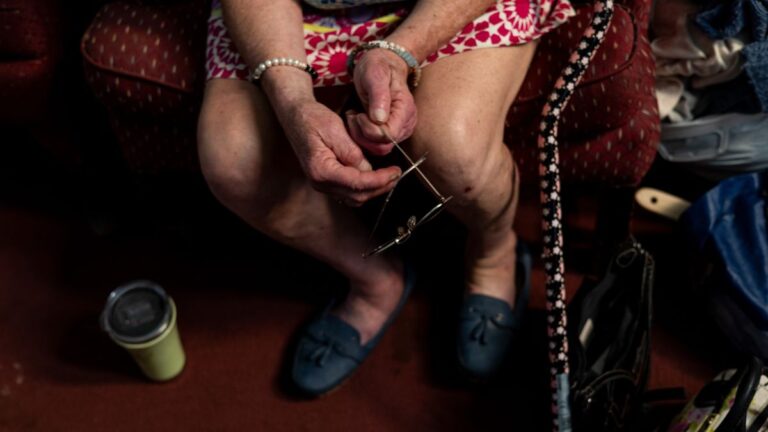A resident in a Rockland assisted living facility died after spending two hours in an outdoor courtyard in December before being found by staff members “in the snow,” according to an investigation by the Maine Department of Health and Human Services.
The resident later died in hospice care and the cause was listed as related to the incident.
This is the second recent example of a resident in a Maine long-term care facility dying after escaping undetected, but state officials and advocates say these incidents are rare.
RELATED STORY: Winthrop nursing home placed on federal “special focus” list
Around 6:40 p.m. on Dec. 18, on a night when the National Weather Service recorded 4.5 inches of snow in the Rockland area, a resident of the Woodlands Memory Care of Rockland got into the secured courtyard undetected, according to DHHS records.
Staff members didn’t notice the resident was missing until 8:20 p.m., when it was time to provide medications. About 20 minutes later, the resident was found “outside in the snow,” according to the state report.
Staffers wrapped the resident in blankets and called emergency services. But Woodlands did not report the incident to the state, according to the report.
The Rockland Fire Department made six visits to the facility that day, according to call logs. All but one was before staff noticed the resident was missing.
Maine DHHS division of licensing and certification received reports of neglect on Dec. 19 and 29, and conducted a site visit on Dec. 21. The investigation found that the facility failed to meet standards for a resident’s “right to freedom from abuse, neglect or exploitation.”
Neither the Rockland facility’s director of operational consulting nor the owner of the Woodlands parent company returned requests for comment this week.
Woodlands Senior Living is a Maine-based company with assisted living and memory care facilities at eight locations in Maine, according to its website. The organization serves more than 600 residents.
Woodlands has not submitted “an acceptable” response to the state investigation, which was first sent to them in March, said Jackie Farwell, DHHS spokeswoman. The facility is appealing the department’s decision to issue a “directed plan of correction,” which tells the facility how and when to address deficiencies.
If Woodlands fails to address the problems, it could be ordered to stop new admissions or face fines.
“The department takes seriously the health and safety of Maine people who rely on these facilities for their care and housing,” Farwell said. “We encourage anyone with concerns for themselves or a loved one to contact the division of licensing and certification. The division investigates facility compliance with licensing rules, and works closely with other state agencies such as adult protective services and the Attorney General’s office as they may conduct independent or joint investigations depending on the nature of the situation.”
The resident’s death was “related to elopement,” according to DHHS records.
An elopement is when a resident who shouldn’t leave the facility without supervision does so without any staff knowing, said Brenda Gallant, Maine’s long-term care ombudsman, who leads an independent nonprofit program that advocates for residents.
Most facilities have safeguards to prevent elopements. The events are rare but do happen, Gallant said.
However, this is the second instance within the same month at a Maine long-term care facility. Also in December, a resident of the Heritage Rehabilitation and Living Center in Winthrop died after she wandered from the facility, then was hit by a vehicle. As a result, the nursing home was placed on a national list of facilities with “serious quality issues.”
Gallant said she is not aware of additional recent incidents where a resident died after escaping a facility.
“In spite of the best efforts of the staff, an elopement can occur,” Gallant said. “If there is an elopement, then the facility has to figure out what happened.”
It’s the facility’s responsibility to assess each resident and set up a plan to keep them safe, she said.
“It is important that they know their residents and know what their capabilities are,” Gallant said. “Residents (who) shouldn’t be unsupervised outside, it’s important that they be aware of that and plan for that.”
The Woodlands resident who died had a history of elopement, employees told DHHS surveyors. They were seen “exit seeking” at dinner time on Dec. 18, the day of the incident.
Another Woodlands incident
Two months earlier, another resident of the Woodlands in Rockland vomited and was taken to the hospital after being served a peanut butter and jelly sandwich despite a peanut allergy.
The resident became “lethargic, figity (sic) and body stiffened,” according to another DHHS investigation. A staff member gave them an EpiPen after they noticed the resident had “shallow breathing, redness all over the body and purple fingernails.”
Woodlands did not initially report the incident to DHHS. In response to an investigation, the facility said it did not believe the incident would be properly considered abuse, neglect or exploitation. It said the facility took actions to protect the resident, such as including information of the allergy in the residents’ service plan and posting it in the kitchen. The staff person failed to look to the allergy listing before serving the resident.
“When the mistake was noted, personnel took immediate action to protect the resident from serious harm and administered the resident’s ordered EpiPen. The resident was transported to the hospital for evaluation and hospice, and the resident’s (power of attorney) were notified immediately,” according to the facility’s response.
“The staff person who failed to follow the facility’s procedures will be disciplined and all staff will be retrained in the use of the allergy listing by 02/17/2022,” according to the facility’s response.
Ask questions while seeking a facility
Investigation documents for assisted living facilities are public. Unlike nursing homes, however, which are federally regulated and posted in a searchable database, assisted living facilities are state regulated.
Each facility must have a copy of its most recent survey available for anyone who visits, said Gallant, the long-term care ombudsman. Family members also can request the documents from the ombudsman program or the state.
Gallant said she recommends that anyone considering a long-term care facility visit the home, request a copy of the survey and ask the facility about any problems and how they plan to address them.
“If they have a loved one going into a facility and let’s say they’re going into memory care where they need close supervision, it would be important to talk to (the facility) about how are they going to keep that family member safe? What kind of training do their staff have? What kind of safety precautions are in place? Ask those kinds of questions,” Gallant said.
Observational skills also are important, she added. Family members should visit during meal times so they can watch interactions between staff and residents.
“What is most important is for family members and residents to be informed and know that there is oversight by the department,” Gallant said. “There are regulations that must be met. We are advocates and we can help out if there’s any kind of concern or problem. Be informed, visit and ask questions.”
Rose Lundy covers healthcare in Maine for The Maine Monitor as a Report for America corps member. Reach her at .gro.1765241342rotin1765241342omeni1765241342ameht1765241342@esor1765241342








